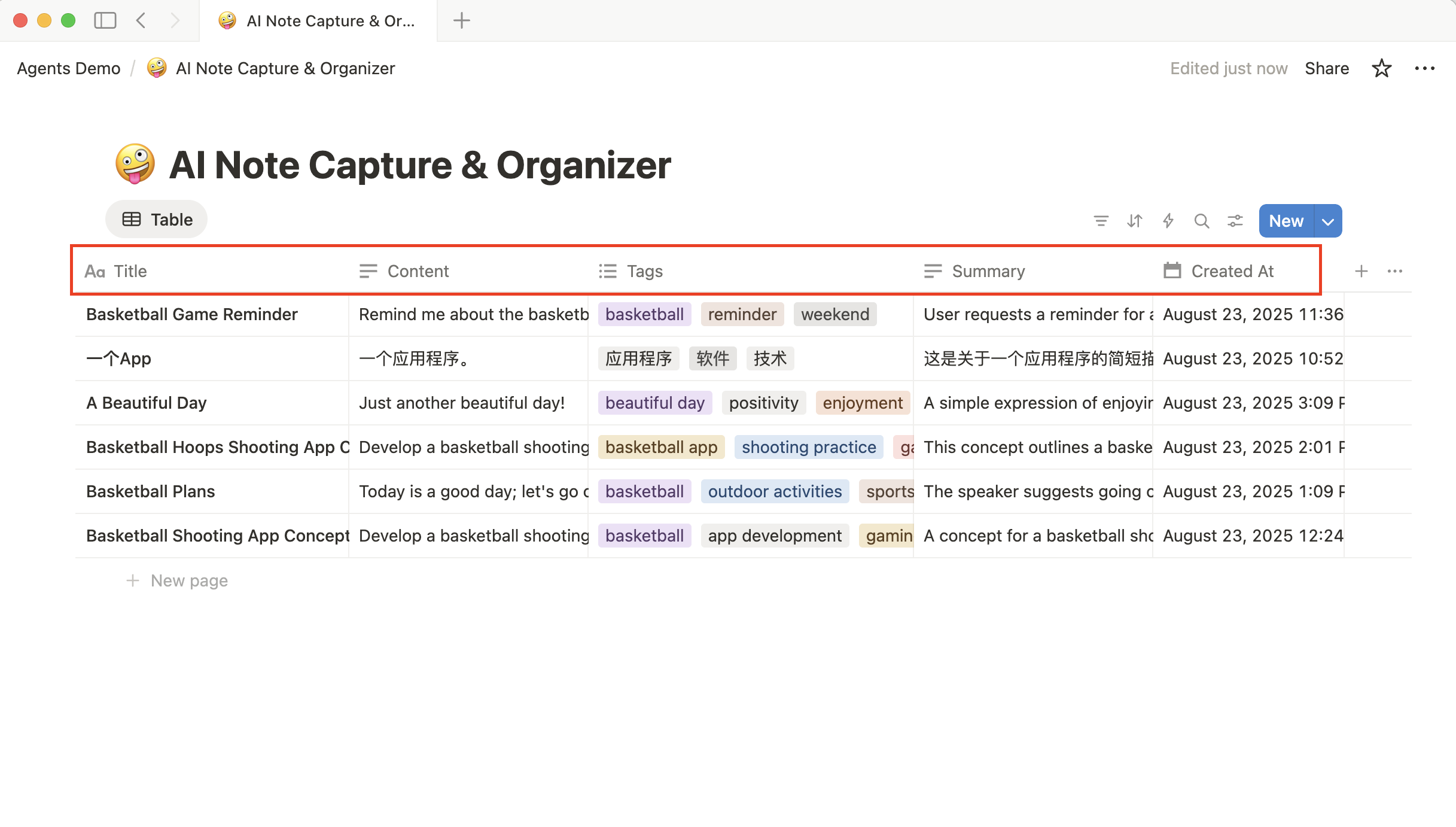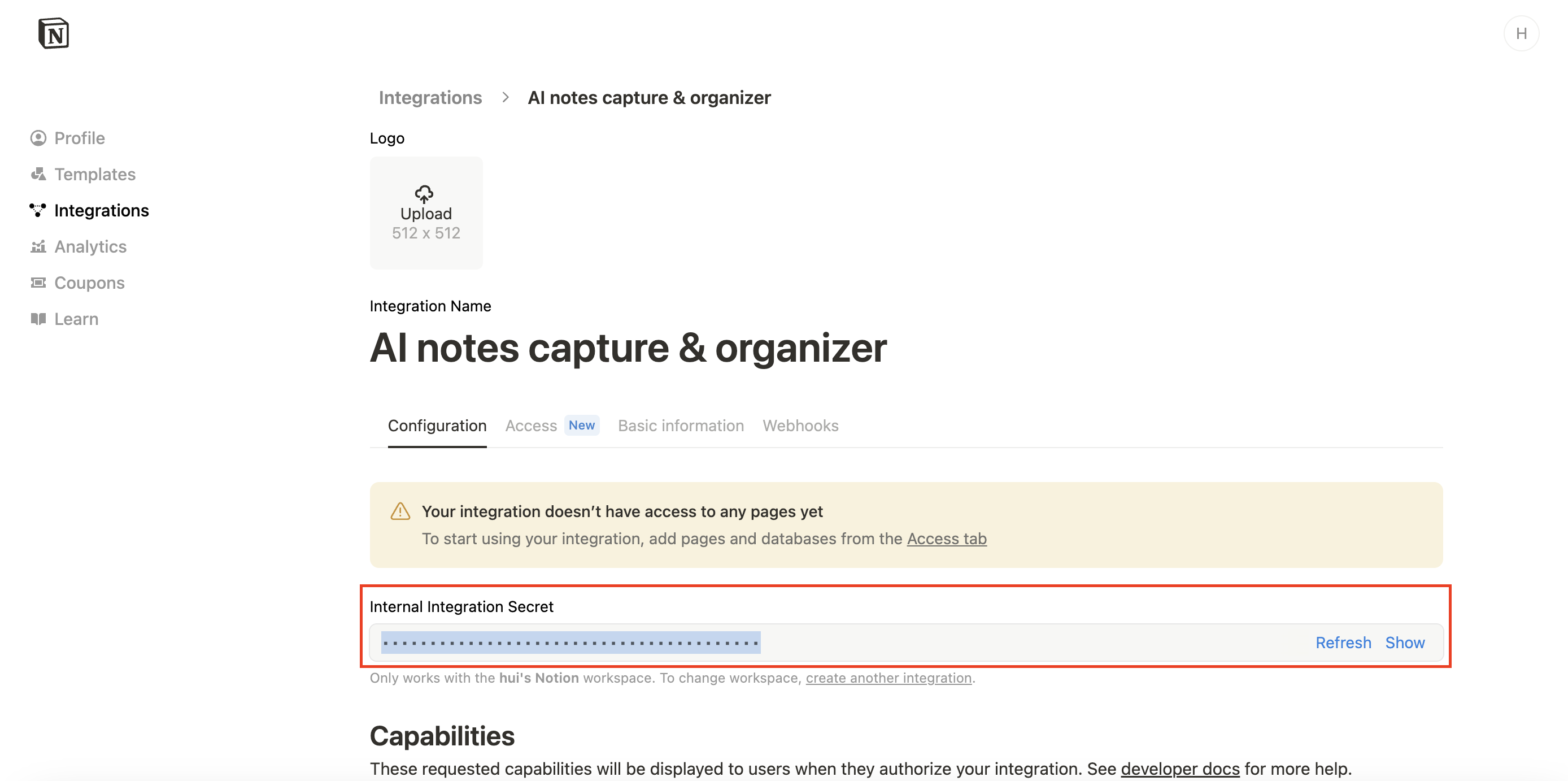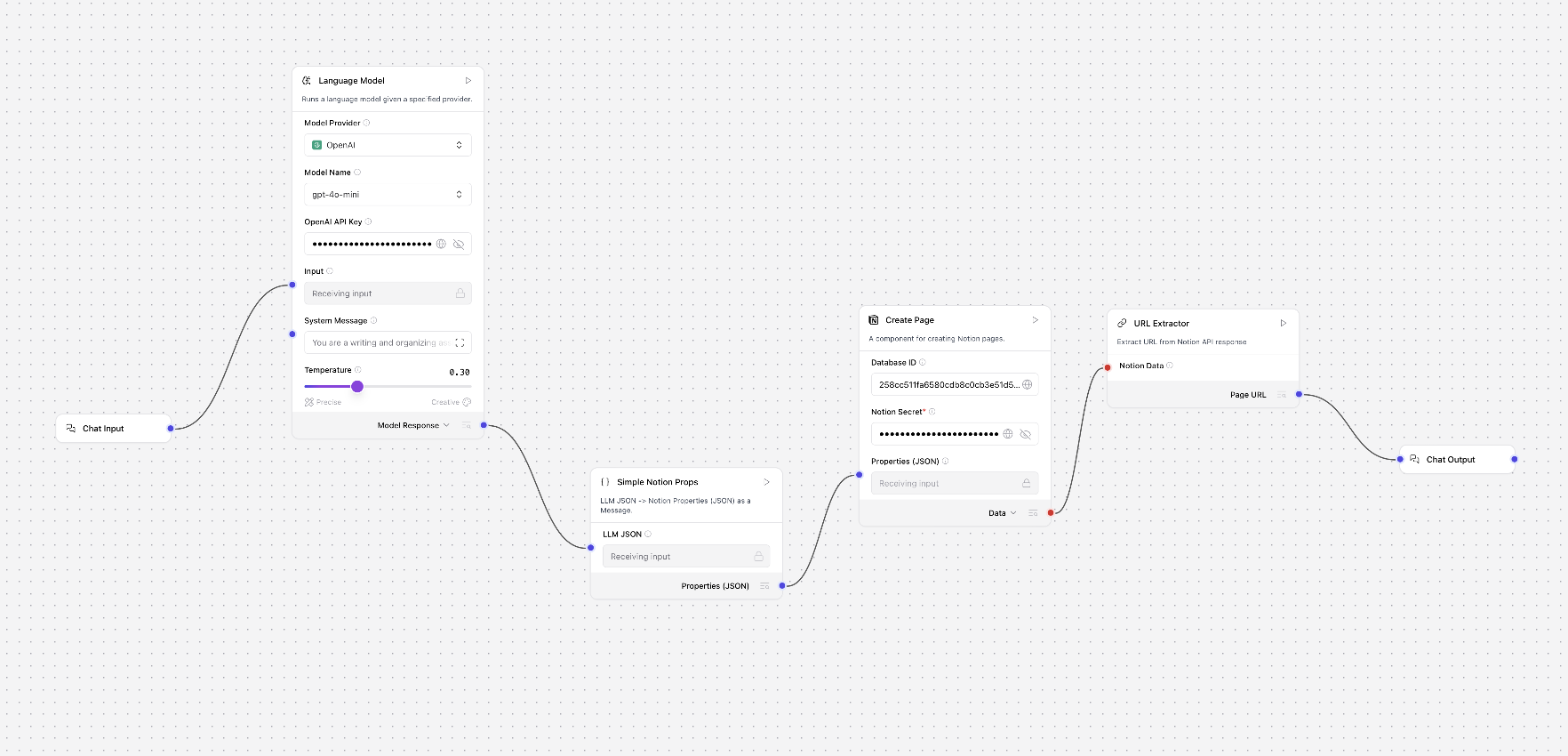How to Build an AI Agent That Turns Random Thoughts into Organized Notion Pages
Stop losing ideas in scattered notes. Build an AI agent that automatically organizes your thoughts and saves you hours of manual sorting.
I was losing hundreds of ideas because I never organized them. Now I just dump any thought into this AI agent and it instantly creates a perfectly formatted Notion page with tags, summaries, and clean text. Here's the exact 15-minute build.

The Setup (5 minutes)
You need:
- Notion (free)
- Langflow Desktop (download here)
- OpenAI API key ($5 credit is plenty)
1. Create Your Notion Database
Make a new database with these exact fields:
- Title (Title)
- Content (Text)
- Summary (Text)
- Tags (Multi-select)
- Created At (Date)

2. Get Notion API Access
- Go to notion.so/my-integrations
- New Integration → Name it → Copy the token
- Share your database with the integration

The Build (10 minutes)
Open Langflow Desktop and create this flow:

Component 1: Text Input
Add Text Input → Name it "Random Note"
Component 2: OpenAI Processing
Add Language Model → OpenAI → Add this system prompt:
You are a writing and organizing assistant. Rewrite the user's raw text concisely, fix grammar, and preserve meaning. Create a clear short title. Generate 1–3 topical tags. Create a brief 1–2 sentence summary. Return ONLY valid JSON in this schema: { "title": "string", "content": "string", "summary": "string", "tags": ["string", ...] } Rules: - Tags: short lowercase phrases, no # or punctuation. - Never add explanations or extra text outside JSON.
Component 3: JSON to Notion Formatter
Add Simple Notion Props (Custom Component) → Connect to Language Model This converts the AI's JSON into Notion's property format
Custom Component Code (simple_notion_props.py):
pythonimport json, re from langflow.custom.custom_component.component import Component from langflow.io import MessageTextInput, Output from langflow.schema import Message from datetime import datetime class SimpleNotionProps(Component): display_name = "Simple Notion Props" description = "LLM JSON -> Notion Properties (JSON) as a Message." icon = "braces" name = "SimpleNotionProps" inputs = [ MessageTextInput( name="raw_json", display_name="LLM JSON", info='LLM output JSON: {"title":"...", "content":"...", "summary":"...", "tags":["..."]}', tool_mode=True, ), ] outputs = [ Output(display_name="Properties (JSON)", name="properties_json", method="build"), ] def _parse(self, raw: str): s = (raw or "").strip() # strip ```json fences if present s = re.sub(r"^```(?:json)?\s*|\s*```$", "", s, flags=re.I) return json.loads(s) def build(self) -> Message: obj = self._parse(self.raw_json) created_at = datetime.utcnow().isoformat() props = { "Title": {"title": [{"text": {"content": (obj.get("title") or "")[:100]}}]}, "Content": {"rich_text": [{"text": {"content": (obj.get("content") or "")[:2000]}}]}, "Summary": {"rich_text": [{"text": {"content": (obj.get("summary") or "")[:2000]}}]}, "Tags": {"multi_select": [{"name": str(t)[:40]} for t in (obj.get("tags") or [])]}, "Created At": {"date": {"start": created_at}}, } return Message(text=json.dumps(props))
Component 4: Create Notion Page
Add Create Page (Notion category) → Enter:
- Your Database ID (from Notion URL)
- Your Integration Token
- Connect to Simple Notion Props output
Component 5: Extract & Display URL
Add URL Extractor (Custom Component) → Chat Output Extracts the Notion page URL from the API response
Custom Component Code (url_extractor.py):
pythonimport json from langflow.custom.custom_component.component import Component from langflow.io import DataInput, Output from langflow.schema import Message, Data class URLExtractor(Component): display_name = "URL Extractor" description = "Extract URL from Notion API response" icon = "link" name = "URLExtractor" inputs = [ DataInput( name="notion_data", display_name="Notion Data", info="The Data object from Notion API response", ), ] outputs = [ Output(display_name="Page URL", name="page_url", method="extract_url"), ] def extract_url(self) -> Message: try: # Get the raw data from the Data object response_data = self.notion_data.data # Extract URL and title url = response_data.get("url", "") title = response_data.get("properties", {}).get("Title", {}).get("title", [{}])[0].get("text", {}).get("content", "Untitled") # Return formatted message output = f"Created: '{title}'\n{url}" return Message(text=output) except Exception as e: return Message(text=f"Error extracting URL: {str(e)}")
Real Examples
Input: "need to refactor the user auth flow its getting messy with all the oauth providers maybe use passport.js or auth0"
Output in Notion:
- Title: Refactor Authentication Flow
- Content: The user authentication flow needs refactoring due to complexity from multiple OAuth providers. Consider implementing Passport.js or Auth0 for cleaner integration.
- Tags: #backend #authentication #refactoring
- Summary: Authentication system needs restructuring to handle OAuth providers more efficiently.

Make It Yours
Voice Input: Connect any speech-to-text tool
Batch Mode: Process multiple notes at once
Smart Tags: Train it on your existing tags
Auto-scheduling: Add calendar integration for time-based notes
The Files
Complete flow file and setup guide: github.com/huiskylabs/AI-notes-capture-organizer
Built this in 15 minutes. Saved me hours already. Your messy notes deserve better.